What's Happening?
Amazon is reportedly advancing its automation strategy, which could significantly reduce the need for human labor in its operations. According to a report from The New York Times, Amazon aims to automate
75% of its operations by 2033, potentially avoiding the need to hire 600,000 workers. The company has already deployed over one million robots and plans to continue expanding its robotics fleet. Amazon's internal documents suggest that the company is preparing for community impacts and potential backlash by engaging in local events to build a positive corporate image. The report also notes that Amazon is considering using terms like 'advanced technology' and 'cobot' instead of 'automation' and 'robot' to soften the perception of its plans.
Why It's Important?
The move towards mass automation by Amazon could have significant implications for the U.S. labor market, particularly in the retail and logistics sectors. By reducing the need for human workers, Amazon could lower operational costs, potentially saving 30 cents per item packed and delivered. However, this shift could lead to job losses and economic challenges for communities reliant on Amazon's employment opportunities. The company's strategy to mitigate backlash by participating in community events highlights the potential social impact of automation. As Amazon continues to expand its robotics operations, other companies may follow suit, accelerating the trend towards automation in various industries.
What's Next?
Amazon plans to hire 250,000 people for the upcoming holiday season, although it remains unclear how many of these positions will be permanent. The company's automation strategy may lead to further discussions and actions from policymakers, labor unions, and community leaders concerned about job displacement. As Amazon continues to develop its robotics technology, the company may face increased scrutiny and pressure to balance automation with human employment. The broader implications for the U.S. economy and labor market will likely be a topic of ongoing debate and analysis.
Beyond the Headlines
The ethical and cultural dimensions of Amazon's automation plans raise questions about the future of work and the role of technology in society. The shift towards automation may necessitate new policies and frameworks to support displaced workers and ensure equitable access to employment opportunities. Additionally, the language used by Amazon to describe its technology reflects broader societal concerns about the impact of automation and artificial intelligence on human labor.










